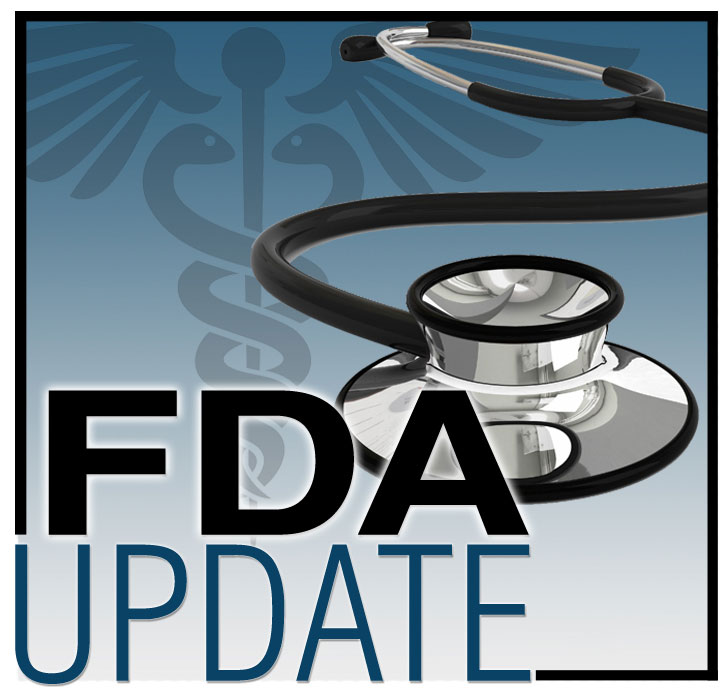FDA Approves Dostarlimab-Gxly With Chemotherapy for Endometrial Cancer
On July 31, 2023, the U.S. Food and Drug Administration (FDA) approved (https://www.fda.gov/drugs/drug-approvals-and-databases/fda-approves-dostarlimab-gxly-chemotherapy-endometrial-cancer?utm_medium=email&utm_source=govdelivery) dostarlimab-gxly (Jemperli) with carboplatin and paclitaxel, followed by single-agent dostarlimab-gxly, for primary advanced or recurrent endometrial cancer (EC) that is mismatch repair deficient (dMMR), as determined by an FDA-approved test, or microsatellite instability-high (MSI-H).

The approval was based on the results of the RUBY trial (NCT03981796), which was a randomized, multicenter, double-blind, placebo-controlled study. The trial evaluated the efficacy of dostarlimab-gxly in a subgroup of 122 patients with dMMR/MSI-H primary advanced or recurrent EC in two groups: one receiving dostarlimab-gxly with carboplatin and paclitaxel, followed by dostarlimab-gxly alone, and the other receiving placebo with carboplatin and paclitaxel, followed by placebo.
The primary effectiveness measure was investigator-assessed progression-free survival (PFS) using RECIST v1.1 criteria. The study demonstrated a significant improvement in PFS for the dMMR/MSI-H population, with a median PFS of 30.3 months for the dostarlimab-gxly regimen compared to 7.7 months for the placebo-containing regimen. The hazard ratio was 0.29, and the results were statistically significant (p < 0.0001).
During the study, some patients receiving dostarlimab-gxly experienced immune-mediated adverse reactions, including pneumonitis, colitis, hepatitis, hypothyroidism, nephritis with renal dysfunction, and skin adverse reactions. The most common adverse reactions reported in 20% or more of patients receiving dostarlimab-gxly were rash, diarrhea, hypothyroidism, and hypertension. Healthcare professionals can find a complete list of adverse reactions in the prescribing information.
The recommended dosing schedule for dostarlimab-gxly is 500 mg every three weeks for six doses in combination with carboplatin and paclitaxel, followed by 1,000 mg monotherapy every six weeks until patients experience disease progression, unacceptable toxicity, or have been on treatment for up to three years. Administer dostarlimab-gxly before chemotherapy when both are scheduled on the same day.
The review was conducted under Project Orbis (https://www.fda.gov/about-fda/oncology-center-excellence/project-orbis), an initiative of the FDA Oncology Center of Excellence (OCE). Project Orbis provides a framework for concurrent submission and review of oncology drugs among international partners. FDA collaborated with other regulatory agencies, including the Australian Therapeutic Goods Administration, Health Canada, Switzerland’s Swissmedic, and the United Kingdom’s Medicines and Healthcare products Regulatory Agency for the review.
The review used the Assessment Aid (https://www.fda.gov/about-fda/oncology-center-excellence/assessment-aid), a voluntary submission from the applicant to facilitate the FDA’s assessment.
The application was granted priority review. FDA expedited programs are described in the Guidance for Industry: Expedited Programs for Serious Conditions—Drugs and Biologics (https://www.fda.gov/regulatory-information/search-fda-guidance-documents/expedited-programs-serious-conditions-drugs-and-biologics).
Healthcare professionals should report all serious adverse events suspected to be associated with the use of any medicine and device to FDA’s MedWatch Reporting System (https://www.accessdata.fda.gov/scripts/medwatch/index.cfm) or by calling 800-FDA-1088.
For assistance with single-patient investigational new drug applications, contact OCE’s Project Facilitate (https://www.fda.gov/about-fda/oncology-center-excellence/project-facilitate) at 240-402-0004 or email OncProjectFacilitate@fda.hhs.gov (mailto:OncProjectFacilitate@fda.hhs.gov).
